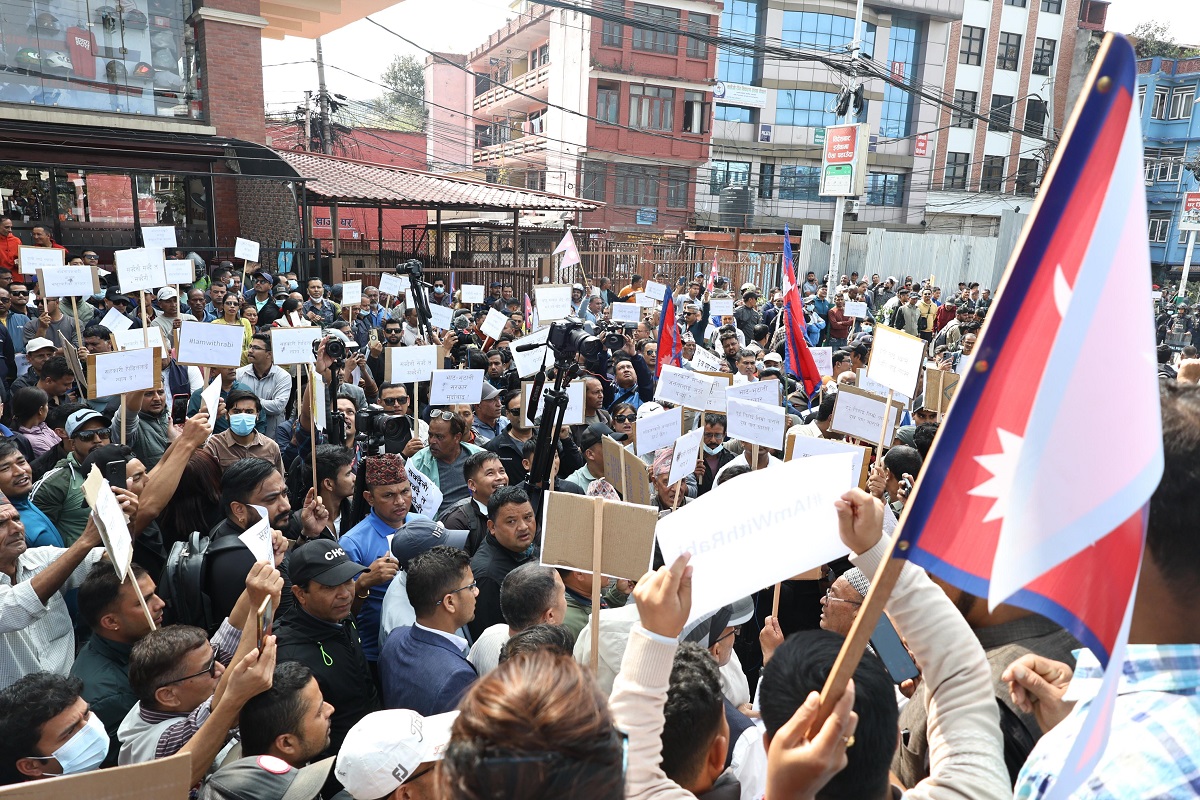KATHMANDU: The Rastriya Swatantra Party (RSP), which launched street protests following the arrest of its Chairman, Rabi Lamichhane, has decided to call off its demonstrations.
A meeting of the central committee held on Tuesday and Wednesday concluded that the party would cease its protests and focus on campaigning for the upcoming by-elections.
The RSP, which has fielded candidates in 26 out of 42 local levels, announced that it will continue its opposition to the government through the local by-elections.
The protests had begun on October 19, shortly after Lamichhane was arrested from the party’s central office on Ocotber 18.
Initially, the RSP framed its protests as a stand against government retaliation linked to the cooperative fraud case involving Lamichhane.
The protests continued until the last week of November. However, as winter set in, the momentum of the street protests gradually faded.
Several factors contributed to the slowdown of the protests. These included ideological disputes and political differences within the party.
As internal divisions became more evident, many critics began accusing the RSP of failing to build widespread public support.
The party, which had no prior experience with large-scale protests, also struggled to keep people mobilized.
Party leaders, particularly those from the RSP emphasized that they did not want to resort to the same tactics as older parties, such as violent protests or road blockages that disrupt daily life.
The RSP was also facing a financial crisis, which further hampered its ability to sustain the protests.
sOrganizing demonstrations across the country, including mobilizing party cadres from different regions, became financially burdensome.
In Pokhara, for instance, the protests dwindled within a week due to funding shortages.
Additionally, Lamichhane’s involvement in the cooperative fraud case eroded public trust in the party, particularly among those who had supported the RSP as a fresh alternative.
As the party’s leader faced serious criminal charges, it became increasingly difficult for the RSP to justify its protests as a movement to “save” Lamichhane.
The party also struggled to gain support from other alternative political forces.
Despite being part of the opposition alliance, the RSP did not receive backing from groups like the Maoist Center, CK Raut’s Janamat Party, Prabhu Sah’s Aam Janata Party, or even Madhav Nepal’s Unified Socialist.
Furthermore, legal challenges against RSP MPs who had been at the forefront of the protests contributed to the movement’s decline.
Ideological differences
From the outset, there were differences within the RSP leadership over the nature of the protests.
As a youth-centered party, many in the RSP felt that the movement should focus on non-disruptive forms of protest rather than road blockages.
Others argued that without mass participation, there would be no real pressure on the government.
After some negotiation between Lamichhane’s core team and other party leaders, the street protests continued for a while.
However, this was the first large-scale street protest for the RSP, and some leaders, like Biraj Bhakta Shrestha, reflected on the lessons learned.
He noted that while other parties had used street protests to gain a foothold in parliament, for the RSP, it was a new experience, and the party had much to learn from it.
Fear of becoming like traditional parties
During Nepal’s struggle for democracy, political parties like the Nepali Congress, CPN-UML, and the Maoist Center often led protests—both peaceful and violent.
The RSP, however, sought to differentiate itself by positioning itself as an alternative to traditional politics.
The Rastriya Swatantra Party has unveiled a new strategy to exert pressure on the government by holding corner meetings during the upcoming by-elections on December 1.
Party leaders, particularly those from the RSP emphasized that they did not want to resort to the same tactics as older parties, such as violent protests or road blockages that disrupt daily life.
MP Ganesh Parajuli expressed this sentiment, stating, “We are not in favor of burning tires on the streets or staging violent protests like the old parties, which cause suffering to the people. Our protests will remain peaceful—we will not create hardship for the public.”
This desire to avoid becoming like the traditional political parties was one of the key reasons the RSP decided to call off its protests.
Legal ground
President Rabi Lamichhane’s case is currently under investigation. He has been in the custody of the Kaski police for the past 34 days.
There is a strong possibility that he will face charges related to cooperative fraud, organized crime, and money laundering.
If found guilty, Rabi Lamichhane’s legal troubles could raise serious questions about the future of the Rastriya Swatantra Party, which rose to prominence largely due to his popularity.
It is believed that this potential legal fallout contributed to the RSP’s decision to suspend its protests.
If it is confirmed that Lamichhane invested cooperative funds in the media, he may face imprisonment.
Political analyst Surendra Labh suggests that the party’s decision to halt its protests could have been motivated by a desire to avoid further complications stemming from this fear.
He stated, “If the court proves that Rabi engaged in illegal activities, he is likely to go to jail. In that case, the responsibility of saving the party will fall on the shoulders of the RSP’s ideological leader.”
Dr. Wagle, along with Biraj Bhakta Shrestha, Shishir Khanal, Sumana Shrestha, Sobita Gautam, Tosima Karki, Dr. Chanda Karki, and others, engaged in discussions with civic leaders, experts, leaders of parties outside the parliament, and new political forces.
He added, “If the RSP truly wants to become more popular among the people, it needs to abandon street protests and focus on ideological and political debates instead.”
By-election plan
The Rastriya Swatantra Party has unveiled a new strategy to exert pressure on the government by holding corner meetings during the upcoming by-elections on December 1.
The party plans to highlight its claim that the government is seeking revenge against Rabi Lamichhane.
This will be the RSP’s first participation in local elections, and it has fielded candidates in 26 out of 42 vacant local level seats. The remaining 16 seats are left uncontested due to a lack of candidates.
The RSP has announced that it will use the by-election meetings to call for the release of Rabi Lamichhane.
RSP leader Biraj Bhakta Shrestha stated that the party will expose what it sees as the government’s retaliatory actions during corner meetings and door-to-door campaigns.
Use of social media in protests
RSP leaders have expressed the need to rise above the suffering of the common people during street protests, as discussed in the central committee meeting on Wednesday.
Given that the RSP is generally opposed to street protests, party leader Sumana Shrestha emphasized that the party would explore other methods while still respecting the public.
Shrestha suggested that the party should approach the people with the facts.
This idea was further supported by others, who noted that the RSP, which has gained significant traction through social media, could use these platforms to advance its movement.
RSP Vice Chairmen Dr. Swarnim Wagle and DP Aryal also weighed in on the discussion, and after receiving their support, the committee decided to take its protest to social media.
“The central committee has decided to protest against the government’s retaliation through social media,” RSP member Shrestha told Khabarhub. “We will use videos and other materials to present the facts and raise our voice.”
Expert’s suggestion
The RSP held a central committee meeting, eight days after the arrest of its Chairman.
The member further added, “We recognized some of our mistakes and engaged in meaningful discussions with parties and citizens outside the parliament. They provided us with constructive suggestions, and the consensus was clear: taking to the streets was not seen as a viable strategy.”
During the meeting, the responsibility for the movement was assigned to Vice Chair DP Aryal, while another Vice Chairman Dr. Swarnim Wagle was tasked with leading citizen dialogue.
Dr. Wagle, along with Biraj Bhakta Shrestha, Shishir Khanal, Sumana Shrestha, Sobita Gautam, Tosima Karki, Dr. Chanda Karki, and others, engaged in discussions with civic leaders, experts, leaders of parties outside the parliament, and new political forces.
Through these discussions, experts and various political observers advised the RSP to abandon street protests in favor of engaging in ideological movements.
Following these consultations, the RSP decided to shift its approach and move away from street protests.
A member of the Citizen Dialogue Committee explained, “The government’s repression during the street protests was not well received by anyone. As a result, we agreed to change the form of the movement.”
The member further added, “We recognized some of our mistakes and engaged in meaningful discussions with parties and citizens outside the parliament. They provided us with constructive suggestions, and the consensus was clear: taking to the streets was not seen as a viable strategy.”









Comment